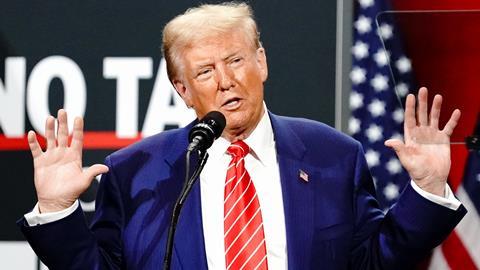Since the beginning of January is a classic time for predictions for the year ahead, I was struck to discover over the past few days that one of my predictions for 2025 has already come true. (This is extremely rare, but it was an easy prophecy to make.)

Back in November, less than a week after Donald Trump was elected, I wrote about the uncertainty now facing EU regulation, since the new president does not like US companies to be regulated by the EU in ways of which he disapproves; therefore, environmental and climate regulation in particular would face challenges.
What I had not realised when I wrote it was that the European Commission had already caved, very shortly after the US election result was announced. After an informal meeting of heads of state of government in Budapest from 7-8 November 2024, the president of the European Commission declared, in remarks not widely reported at the time, that there would be a decisive move away from the European Green Deal programme of the last five years. The Green Deal put climate and the environment at the centre of lawmaking, but she said that three of its recent flagship directives would be simplified: the Corporate Sustainability Reporting Directive (CSRD), the Corporate Sustainability Due Diligence Directive (CSDDD), and the EU Taxonomy.
She said: ‘The questions we are asking, the data points we are collecting — thousands of them — is too much, often redundant, often overlapping. So it’s our task to reduce this bureaucratic burden without changing the correct content of the law that we all want.’
To take just the CSDDD – which affects lawyers the most, since the biggest law firms and the biggest clients may be caught by it – it only passed into law on 24 July 2024, after a lengthy passage and negotiation through the legislative process. It is not due to come into force until 26 July 2026. And she says this now?
Of course, president-elect Trump was not the only driver. The EU, like the UK, wants to grow and be competitive – there was a competitiveness declaration agreed at the meeting - and a loud complaint for some time has been that regulation stifles business activity.
There was an earlier warning of the direction of travel a month before her announcement when the European Commission proposed a 12-month delay to the application of the anti-deforestation regulation, which requires extensive diligence on the value chain to ensure that goods do not result from recent deforestation, forest degradation or breaches of local environmental and social laws.
Yet the election of Trump had been discussed at the Informal Council meeting which immediately preceded her remarks, and his return in any case chimes with the zeitgeist of rising far-right populism, as reflected in the outcome of the European Parliament elections of summer 2024.
What does all this have to do with lawyers? We in the UK are seeing, well before his actual assumption of office, thatTrump and his court are influencing the political weather, including on our own laws and legal system.
Just last week, on the same subject of climate and energy, the incoming president posted: ‘The UK is making a very big mistake. Open up the North Sea. Get rid of Windmills!’ (Some believe that he meant that the UK government should get rid of the windfall tax on energy companies.) Our government, not surprisingly, seems undecided how to respond.
But it is the posts of his other advisers and financial backers, such as Elon Musk, which most touch our legal system. During a multi-day posting binge of hundreds of messages, which is continuing as I write, Musk called for UK government officials to be hanged and jailed, reposted tweets calling on the King to dissolve parliament, insisted on the removal of our prime minister (and also the leader of another party), called one of our ministers ‘a rape genocide apologist’, suggested a far-right activist in prison for contempt of court for repeating false claims be released, and instituted a poll on whether America should liberate the people of Britain from their tyrannical government. The Trump presidency is now days away.
The rule of law is one of our lawyer responsibilities (including proper accountability for the grave child abuse scandals which gave rise to much of his volcanic outburst).
I know that, in many ways, we are a vassal state of the US: 25% of our GDP is apparently made up of sales from 1,256 US multinationals operating in Britain (breakfast cereals, soft drinks, car manufacture, taxis, food delivery, online shopping, travel, coffee, social media, entertainment, data and finance, while our best tech start-ups are taken over by US companies).
But our rule of law and its accompanying legal system remain our own. Of course, we must own up to and fix its grave faults, including the Horizon scandal. But I predict that in 2025 we will be called on to stand up for our rule of law and legal system.
Jonathan Goldsmith is Law Society Council member for EU & International, chair of the Law Society’s Policy & Regulatory Affairs Committee and a member of its board. All views expressed are personal and are not made in his capacity as a Law Society Council member, nor on behalf of the Law Society
































8 Readers' comments